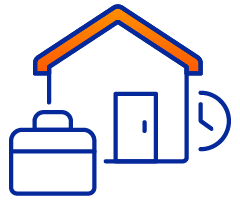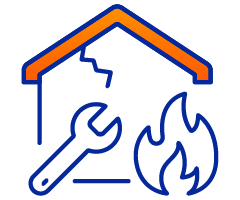Start Here
Homepage Bottom Form
We will get back to you as soon as possible.
Please try again later.
Pet Recovery & Safety Checklist After a House Fire
🐶🐱 Pet Recovery & Safety Checklist After a Fire
Created by House Fire Solutions – Helping Families and Their Pets Recover, Rebuild, and Heal Together
After a fire, your pets may experience
physical injuries, stress, or trauma — just like you.
They’ve lost their familiar surroundings, smells, and routines. This checklist will help you
keep them safe, healthy, and emotionally supported throughout recovery.
❤️ 1. Ensure Immediate Pet Safety
Right after the fire, your main goal is to make sure your pets are out of danger and medically stable.
- Remove all pets from the burned structure immediately.
- Keep them in a quiet, secure area away from smoke, debris, and flashing lights.
- Use leashes, carriers, or crates — frightened pets may run away or hide.
- If you can’t find a pet, notify firefighters or animal control immediately.
- Avoid re-entering the building to look for pets until cleared by officials.
- Once safe, give water and let them calm down — avoid food until they’ve rested.
- Take note of any signs of injury, burns, limping, or labored breathing.
💡 Pro Tip: Even if your pet seems fine, they may have smoke inhalation or internal injury — get them checked as soon as possible.
🩺 2. Get Veterinary Care Immediately
Even mild smoke exposure or heat can be serious for pets.
- Take your pet to the nearest veterinarian or 24-hour emergency animal hospital.
- Ask for a full physical exam and smoke inhalation screening.
- Common symptoms to report:
- Coughing, wheezing, or difficulty breathing
- Burns, singed fur, or irritated eyes
- Lethargy, drooling, vomiting, or confusion
- Ask your vet for pain relief and oxygen therapy if needed.
- Request copies of all vet records for your insurance or FEMA claim.
- Keep follow-up appointments — symptoms can appear days later.
💡 Pro Tip: Take photos of your pet’s injuries and medical care for your insurance documentation.
🏠 3. Secure Safe Temporary Housing for Pets
Avoid taking your pets back into the burned or smoke-damaged home.
- Find pet-friendly temporary housing — hotels, rentals, or family homes.
- Check if your insurance covers pet boarding or temporary care.
- Contact local animal shelters or rescue groups for emergency foster placement.
- Keep pets indoors — even if they were outdoor animals before — to prevent confusion or escape.
- Use familiar bedding or toys to comfort them.
💡 Pro Tip: Keep your pet’s ID tags and microchip info up to date in case they get lost during relocation.
🥣 4. Replace Damaged or Contaminated Pet Supplies
Anything exposed to fire, heat, or smoke may be unsafe.
Replace these items immediately:
- Food and water bowls (plastic ones can absorb toxins)
- Pet food, treats, and supplements (contaminated by smoke or soot)
- Bedding, blankets, and toys (retain odors and chemicals)
- Collars, leashes, and harnesses (weakened by heat)
- Litter boxes and small animal bedding
- Medications and first-aid supplies
💡 Tip: Wash or replace anything that smells smoky — pets’ noses are extremely sensitive.
🧾 5. Document Everything for Insurance & Aid
If your homeowner’s insurance includes pet coverage or property protection, these records matter.
- Keep copies of:
- Veterinary bills
- Boarding or housing receipts
- Replacement purchases (beds, food, crates)
- Photos of pet injuries or lost items
- Ask your insurer if they reimburse for pet care expenses under your Loss of Use or Contents policy.
- Register with FEMA Disaster Assistance if your area is declared a disaster zone — some aid includes pet expenses.
💡 Pro Tip: Keep a digital folder for all pet-related recovery documents.
🐾 6. Help Your Pets Emotionally Recover
Pets experience trauma just like people — they may be scared, jumpy, or withdrawn.
- Maintain a calm environment — avoid loud noises or chaos.
- Rebuild their daily routine: meals, walks, playtime, bedtime.
- Speak gently and keep physical affection consistent.
- Don’t scold fear-based behavior (accidents, hiding, chewing).
- Give your pets safe spaces — like a crate, quiet room, or soft blanket corner.
- Use pheromone diffusers or calming sprays (like Adaptil or Feliway).
- Consider a veterinary behaviorist if anxiety persists.
💡 Tip: Dogs and cats can grieve, too — allow them time and comfort.
🐕🦺 7. If a Pet Is Missing
Act quickly — time matters after a fire.
- Alert your local animal control, fire department, and nearby shelters.
- Post clear photos and descriptions on:
- Petfinder
- PawBoost
- Local Facebook and Nextdoor groups
- Visit shelters in person every 24–48 hours — don’t rely on phone calls.
- Notify your vet and microchip registry that your pet is missing.
- Leave familiar items (blanket, food, crate) near your home’s perimeter — scent can guide them back.
💡 Pro Tip: Microchipped pets have over a 50% higher return rate — update your contact info today.
🧹 8. Prepare for Home Re-Entry
When it’s safe to return home:
- Keep pets out of the house until the air is cleared and cleaned professionally.
- Ensure no broken glass, insulation, or soot remains.
- Clean and disinfect all pet spaces before reintroducing them.
- Watch for signs of fear or avoidance — pets may associate smells with trauma.
- Stay nearby the first few days for reassurance.
💡 Tip: Let pets re-explore slowly — avoid forcing them into old areas.
🧰 9. Create a New Pet Emergency Kit
Being prepared helps protect your pets in future emergencies.
Include:
- 3–5 days of pet food and bottled water
- Collapsible food/water bowls
- Medications and copies of prescriptions
- Leash, harness, and carrier
- Recent photo and ID info
- Blanket or toy
- Flashlight and waste bags
- Pet first-aid kit
- Contact list for vet, shelter, and family
💡 Pro Tip: Keep this kit near your front door or evacuation bag.
🩵 10. Rebuild Trust and Comfort Over Time
Healing takes patience — for you and your pets.
- Rebuild routines one day at a time.
- Provide extra affection and play to rebuild confidence.
- Watch for triggers — loud sounds or smoke smells — and comfort gently.
- Keep your tone calm and reassuring.
- Celebrate recovery milestones: “First night in our new home,” “First playful moment again.”
💡 Tip: Pets mirror your emotions — your calm presence helps them heal faster.
🕯️ Final Reflection
“Your pets look to you for safety — and you’ve already been their hero once.
Every soft word, every meal, every walk is another step toward healing — for both of you.”
Our Team Helps You Navigate Insurance, Restoration, and Rebuilding
It is a long established fact that a reader will be distracted by the readable content of a page when looking at its layout.

Board-Up
Our Network of Board Up Specialist Will Secure your property fast

Temp Housing
We'll Help You Find Safe Shelter while you recover

Public Adjusters
Our Network of Fire Damage Adjusters Will Fight Help for a fair insurance payout

Investors
Our Partner Specializes in Buying Fire Damaged Homes So you Can Sell your home as-is

Content Cleaning
Restore what matters most

Restoration
Bring your home back to life

Attorneys
We have a network of Protect your rights and claims

Mental Health
Support for you and your family
Want To See If We Can Help You
If you'd like to speak with us today about purchasing Social Security, Personal Injury, Workers' Compensation or Employment Law Leads.
Homepage Bottom Form
We will get back to you as soon as possible.
Please try again later.